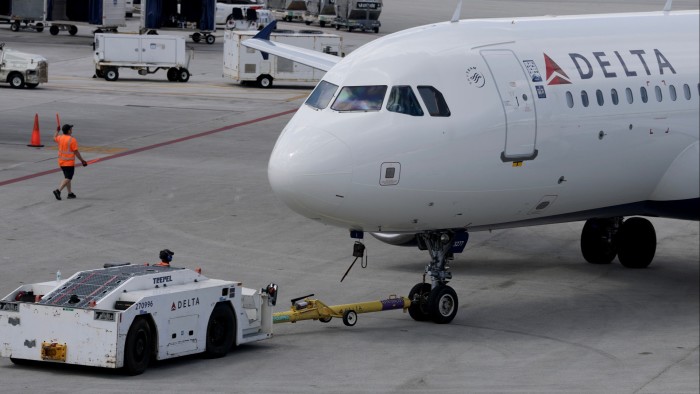Unlock the White House Watch newsletter for free
Your guide to what the 2024 US election means for Washington and the world
Tariffs are bad for companies that move goods across borders. But what about those whose cargo consists of holidaymakers and business travellers? Clues from the airline world suggest things are getting bumpy.
Having entered 2025 with an upbeat outlook, major carriers — like many other industries — are casting aside their exuberance after the US unleashed its trade wars on the rest of the world. The NYSE Arca Airline index is down 20 per cent so far this year. That is nearly three times more than the losses recorded by the S&P 500.
While tariff newsflow will make for volatile share prices, it is the uncertainty that affects companies’ business plans. Delta Air Lines’ plan to cut back on planned capacity growth amid a slowdown in demand is a dramatic reversal from January when chief executive Ed Bastian said the US operator — one of the country’s big four — was on track for its most profitable year ever.
The caution is understandable. The airline sector is a bellwether for the wider economy. Leisure travel is usually one of the first things to go when consumers start feeling anxious about the economy. There are other dents, too. Government cost-cutting drives could result in fewer public-sector travellers. Amid the uncertainty, companies may rein in business trips. Canadians — who make up the biggest group of international visitors to the US — may be less inclined to visit their irascible southern neighbour.
If empty seats are to be minimised, prices will have to come down. UBS now expects revenue per available seat mile for the six biggest US airlines to be down by an average of 1.2 per cent this year, compared with its previous forecast for 1.85 per cent growth.
Falling fuel prices will help cushion the blow. And, for now, the slowdown in demand is mainly concentrated in domestic leisure and corporate travel. Premium and transatlantic travel — which are more lucrative — are holding up. This means airlines with more premium and international exposure, such as Delta, may be the best placed to ride out the turbulence.
Other revenue streams can provide a little extra stabilisation. Delta’s partnership with American Express — which makes up the bulk of its SkyMiles loyalty programme — brought in $7.4bn of revenue last year, around 12 per cent of the total.
Yet the headwinds are overwhelming. Airlines, with their heavy investment needs, thin margins and — often — high debt loads, are used to financial rough air. The fact that no major country has yet slapped a tariff on tourists won’t make what’s coming any easier.
pan.yuk@ft.com

